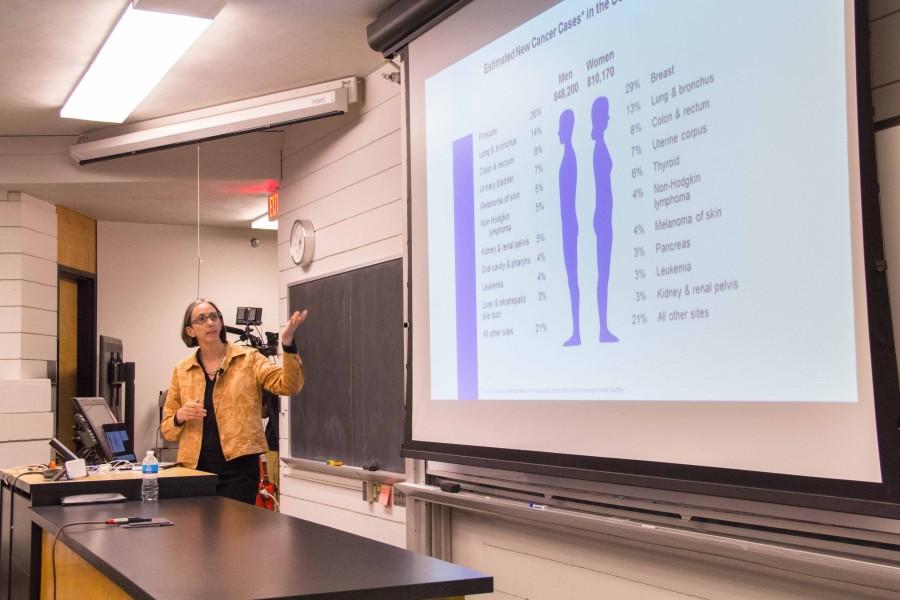Alumni rethinks cancer treatment
Oct 26, 2015
New approaches to cancer treatment were discussed at the 19th annual Leland Wilson Lectureship. It washeld on Thursday at 7 p.m. in the Lantz Auditorium in McCollum Science Hall.
“The aim of this lecture is to have speakers who can talk about their fields in a compelling way that provides a wider public with a better understanding of what makes science compelling,” said Laura Strauss, UNI department head and professor of the department of chemistry and biochemistry.
“The lectureship was initiated in 1997 by colleagues, family, and former students to honor Professor Wilson’s many contributions to the Department of Chemistry and Biochemistry and the UNI community,” said Strauss.
The evening was led by 1991 UNI alumni, Kimryn Rathmell. Rathmell was recently named as the Cornelius Abernathy Craig Professor of Medicine and Director of the Division of Hematology and Oncology at Vanderbilt University.
Her presentation was about new ways to treat cancer titled, “The Exciting State of Affairs for Drug Development in Cancer: 2015.” Among the strategies discussed were the use of small molecules to block “previously undruggable” targets and to rely on the immune system to destroy cancer cells.
“I’m very interested in the topic that Dr. Rathmell is going to be speaking about tonight,” said Theresa Spradling, a UNI professor of biology who was in the audience. “I’ve looked at some of her work since I found out she was coming to UNI, but I didn’t necessarily know a lot about her before. With some research, I discovered that she has been extremely involved and has a really impressive record.”
Rathmell discussed numerous topics dealing with cancer, such as how cancer works, exciting new findings and why cancer has not been cured yet. Within these explanations, Rathmell displayed various number charts and pictures of mutations and cancer cells.
Rathmell stated that her most interested area of research is kidney cancer, even though it may not be one of the most predominant cancers today.
“Modern research becomes harder, bigger, more collaborative and more expensive,” Rathmell said.
Libby O’Mohundro, senior business administration and management major, said she learned a lot of new information.
“I learned that there are multiple forms of cancer cells, that all require different treatment methods,” said O’Mohundro.
Dianna Huisman, sophomore biology and biochemistry double major was also attended Rathmell’s lecture.
“I’m really interested in doing cancer research,” Huisman said. “I want to know more about what they are doing differently in cancer research now.”
The most popular question everyone had was, ‘Why haven’t we cured cancer yet?’
“Cancer is many different diseases, and cancer cells have programs that permit rapid adaptability,” Rathmell said. She also elucidated the fact that “bringing something back to life is much harder than killing something.”
Even though cancer research can be very difficult to find a precise solution for, Rathmell said there has been much progress in the field.














